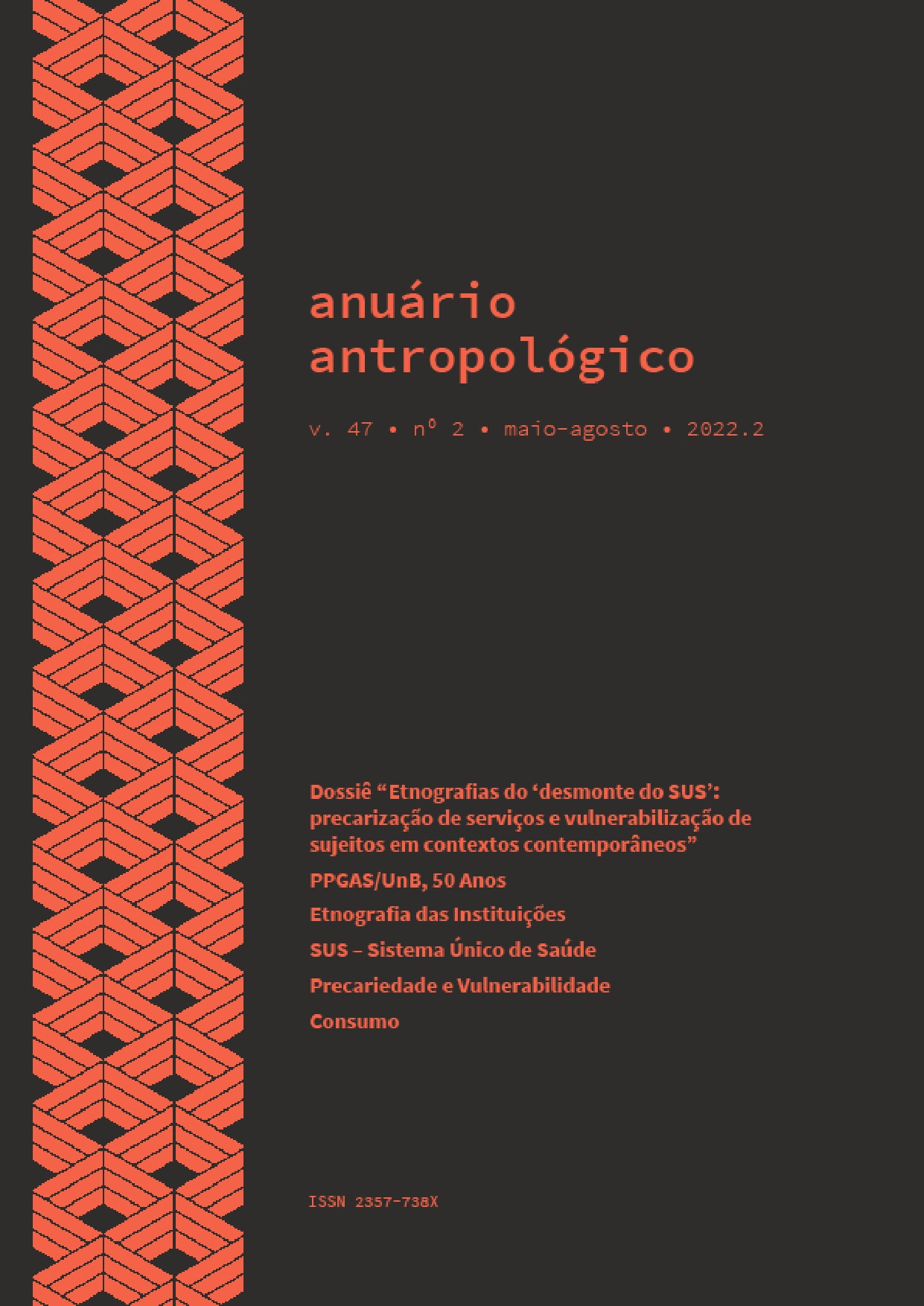Doubly lethal: the psychological deterioration of healthcare professionals during the covid-19 pandemic
DOI:
https://doi.org/10.4000/aa.9704Keywords:
Precarization, SUS, CAPS AD, PandemicAbstract
This article sets out to describe and develop an analysis of how the precarization of the Unified Health System (SUS) affects the processes of subjectivation of the bodies that compose it. Using data collected from ethnographic research at an Alcohol and Drug Psychosocial Care Centre (CAPS AD) located in a municipality in the interior of São Paulo state, I explore the impacts that large-scale epidemiological events have on the mental health of the affected populations, particularly the healthcare professionals who continued to pursue their professional activities under such conditions. I first demonstrate the particularity of the covid-19 pandemic through an analysis of the political contingencies that singularize the Brazilian case within the pandemic’s global context. Next, I connect macrostructuring political processes with the quotidian micropolitics of care and the affects that they mobilize. To highlight the pathways through which major changes affect individual life trajectories, I use the theoretical matrix developed by the field of the anthropology of emotions. In support of my argument, I turn to interviews and ethnographic narratives that constituted my field material during my master’s degree research, initiated and completed during the covid-19 pandemic.
Downloads
References
Carvalho, Heráclito Barbosa de, and Sergio Dario Seibel. 2009. “Crack cocaine use and its relationship with violence and HIV”. Clinics 64: 857–66.
Castro, Rosana, Cíntia Engel, and Raysa Martins. 2018. Antropologias, saúde e contextos de crise. Brasília: Sobrescrita.
Coelho, Maria Claudia Pereira, and Susana Soares Branco Durão. 2017. “Introdução ou como fazer coisas com emoções”. Interseções: Revista de Estudos Interdisciplinares 19(1): 44–60.
COFEN – Conselho Federal de Enfermagem. 2021. “Brasil perde ao menos um profissional de saúde a cada 19 horas para a covid”. http://www.cofen.gov.br/brasil-perde-ao-menos-um-profissional-de-saude-a-cada-19-horas-para-a-covid_85778.html
Cruz, Vania Dias et al. 2013. “Consumo de crack e a tuberculose: uma revisão integrativa”. SMAD – Revista Electrónica em Salud Mental, Alcohol y Drogas 9(1): 48–55.
Csordas, Thomas. 2008. “A corporeidade como paradigma da Antropologia”. In Corpo/significado/cura (v. 5). Porto Alegre: Editora da UFRGS.
Das, Veena. 2015. Affliction: health, disease, poverty. New York: Fordham University Press.
Das, Veena, and Ranendra K. Das. 2006. “Pharmaceuticals in urban ecologies”. In Global pharmaceuticals, org. Adriana Petryna, Andrew Lakoff, and Arthur Kleinman, 171–205. Durham: Duke University Press.
Faria, Paula de Fátima Oliveira, Sabrina Helena Ferigato, and Isabela Aparecida de Oliveira Lussi. 2020. “O apoio matricial na rede de atenção às pessoas com necessidades decorrentes do uso de álcool e outras drogas”. Cadernos Brasileiros de Terapia Ocupacional 28: 931–49.
Foucault, Michel. 2012. História da sexualidade I: a vontade de saber. Translated by Maria Thereza da Costa Albuquerque. São Paulo: Graal.
Han, Byung-Chul. 2021. “Teletrabalho, zoom e depressão: o filósofo Byung-Chul Han diz que exploramos a nós mesmos mais do que nunca”. El País, Brasil, 22 mar. 2021. Cultura, Ideias. https://brasil.elpais.com/cultura/2021-03-23/teletrabalho-zoom-e-depressao-o-filosofo-byung-chul-han-diz-que-nos-exploramos-mais-que-nunca.html?eventlog=oklogin
Kuper, Hannah et al. 2019. “The association of depression, anxiety, and stress with caring for a child with Congenital Zika Syndrome in Brazil; Results of a cross-sectional study”. PLoSneglected tropical diseases 13(9): e0007768.
Lancetti, Antonio. 2015. Contrafissura e plasticidade psíquica. São Paulo: Hucitec.
Latour, Bruno. 2020. Imaginar gestos que barrem o retorno da produção pré-crise. Translated by Débora Danowski and Eduardo Viveiros de Castro. https://n-1edicoes.org/008-1
Lutz, Catherine A. 2011. Unnatural emotions. Chicago: University of Chicago Press.
Lutz, Catherine A., and Lila Abu-Lughod. 1990. « Language and the politics of emotion”. In This book grew out of a session at the 1987 annual meeting of the American Anthropological Association called "Emotion and Discourse". Editions de la Maison des Sciences de l'Homme.
Lotta, Gabriela et al. 2021. Nota Técnica à Pandemia de Covid-19 e os(as) Profissionais de saúde Pública no Brasil – 4ª Fase. Rio de Janeiro: FGV/EASP/Fiocruz. https://portal.fiocruz.br/sites/portal.fiocruz.br/files/documentos/a-pandemia-de-covid-19-e-os-profissionais-de-saude-publica-no-brasil_fase-4.pdf
Machado, Maria Helena, coord. 2017. Perfil da enfermagem no Brasil: relatório final – Brasil. Rio de Janeiro: NERHUS/DAPS/ENSP/Fiocruz.
Martins, Tatiana, Janaína Luz Narciso-Schiavon, and Leonardo De Lucca Schiavon. 2011. “Epidemiologia da infecção pelo vírus da hepatite C”. Revista da Associação Médica Brasileira 57(1): 107–12.
Minayo, Maria Cecília de Souza, and Neylson Freire. 2020. “Pandemia exacerba desigualdades na Saúde”. Ciência & Saúde Coletiva 25(9): 3555–6.
Parker, Richard. 2003. “Construindo os alicerces para a resposta ao HIV/AIDS no Brasil: o desenvolvimento de políticas sobre o HIV/AIDS, 1982–1996”. Divulgação em Saúde para Debate 1(27): 8–49.
Preciado, Paul B. 2020. “Aprendiendo del vírus”. El país. https://elpais.com/elpais/2020/03/ 27/opinion/1585316952_026489.html
Povinelli, Elizabeth A. 2011. Economies of abandonment. Durham: Duke University Press.
Rezende, Claudia Barcellos, and Maria Cláudia Coelho. 2010. Antropologia das emoções (Série Sociedade e Cultura). Rio de Janeiro: Editora Fundação Getúlio Vargas.
Rui, Taniele Cristina. 2012. Corpos abjetos: etnografia em cenários de uso e comércio de crack. Doctoral Thesis, Universidade Estadual de Campinas, Campinas.
Rutstein, David D. et al. 1976. “Measuring the quality of medical care: a clinical method”. New England Journal of Medicine 294(11): 582–8.
Stengers, Isabelle, and Philippe Pignarre. 2011. Capitalist sorcery: breaking the spell. New York: Palgrave.
Xiang, Yu-Tao et al. 2020. “Timely mental health care for the 2019 novel coronavirus outbreak is urgently needed”. The Lancet Psychiatry 7(3): 228–9.
Downloads
Published
How to Cite
Issue
Section
License
Copyright (c) 2023 Anuário Antropológico

This work is licensed under a Creative Commons Attribution-NonCommercial-NoDerivatives 4.0 International License.
https://creativecommons.org/licenses/by/4.0/legalcode.en
Creative Commons - Atribución- 4.0 Internacional - CC BY 4.0
https://creativecommons.org/licenses/by/4.0/legalcode.en



